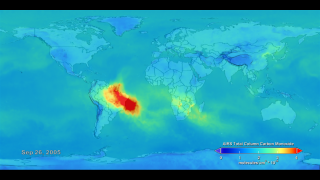Following The Carbon Monoxide Trail
The slash-and-burn practices farmers use in parts of South America to clear land before planting in the spring added to a severe Amazon fire season in 2005. Dramatic increases in carbon monoxide were recorded over South America in August, September, and October of that year. But a satellite instrument also saw the fire emissions travel far beyond the continent. Plumes of the colorless, odorless gas, which can linger in the atmosphere up to three months, moved across the Atlantic Ocean and likely affected the air quality over Africa. Scientists measured this carbon monoxide path using an instrument called AIRS onboard NASA's Aqua satellite. AIRS was designed to measure water vapor, clouds, and air and land temperatures. Once it was launched, scientists realized they could use it to make global carbon monoxide and carbon dioxide measurements, providing unprecedented global views of greenhouse gas distributions in the atmosphere. Watch in the visualization below how AIRS saw carbon monoxide fire emissions sweep out over the Atlantic Ocean, above Africa, toward the Indian Ocean and all the way to Australia.

Daily global carbon monoxide measurements lend insight into the impact of fire emissions on our atmosphere.
Areas in red denote carbon monoxide concentration two to three times higher than areas in blue.

The intense red in this Sept. 26, 2005 image illustrates the highest level of carbon monoxide recorded in the 2005 burn season.

Carbon monoxide is not often thought of as a greenhouse gas, but in the atmosphere it reacts with hydroxyl radical (OH) to form carbon dioxide.

Astronauts captured this image from space, illustrating the environmental impact of the slash and burn technique used in the Amazon.
Credits
Please give credit for this item to:
NASA's Goddard Space Flight Center
Image of Amazon rainforest fires captured from space courtesy of the Image Science & Analysis Laboratory, NASA Johnson Space Center.
-
Animator
- Lori Perkins (NASA/GSFC)
-
Scientists
- Tom Pagano (NASA/JPL CalTech)
- Edward Olsen (NASA/JPL CalTech)
- Hai Nguyen (California Institute of Technology)
-
Writer
- Alison Schuyler Ogden (NASA/GSFC)
Release date
This page was originally published on Tuesday, December 6, 2011.
This page was last updated on Wednesday, May 3, 2023 at 1:53 PM EDT.
